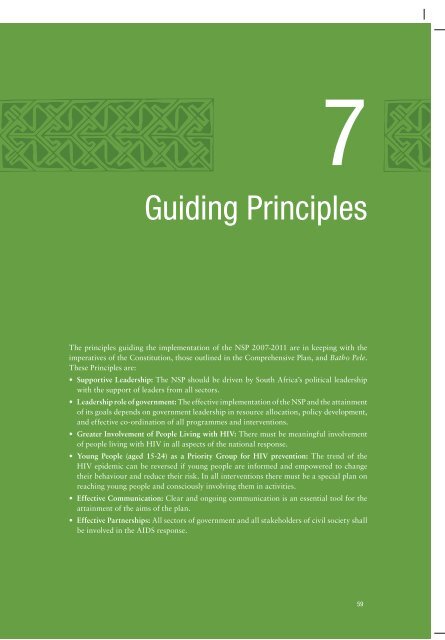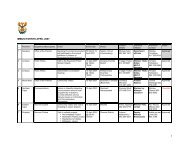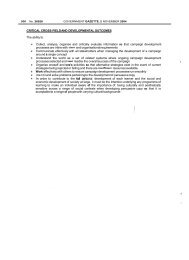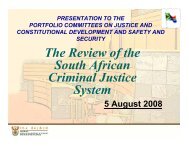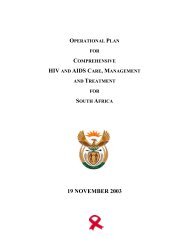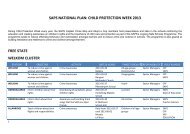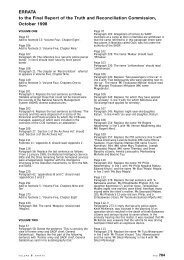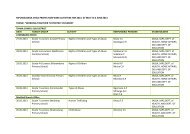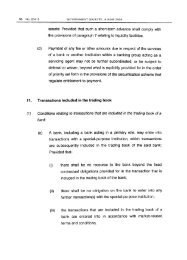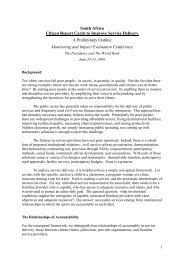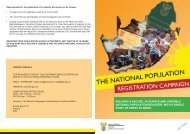Guiding Principles - South Africa Government Online
Guiding Principles - South Africa Government Online
Guiding Principles - South Africa Government Online
You also want an ePaper? Increase the reach of your titles
YUMPU automatically turns print PDFs into web optimized ePapers that Google loves.
XXXXXXXX<br />
CHAPTER NAME<br />
7<br />
<strong>Guiding</strong> <strong>Principles</strong><br />
The principles guiding the implementation of the NSP 2007-2011 are in keeping with the<br />
imperatives of the Constitution, those outlined in the Comprehensive Plan, and Batho Pele.<br />
These <strong>Principles</strong> are:<br />
• Supportive Leadership: The NSP should be driven by <strong>South</strong> <strong>Africa</strong>’s political leadership<br />
with the support of leaders from all sectors.<br />
• Leadership role of government: The effective implementation of the NSP and the attainment<br />
of its goals depends on government leadership in resource allocation, policy development,<br />
and effective co-ordination of all programmes and interventions.<br />
• Greater Involvement of People Living with HIV: There must be meaningful involvement<br />
of people living with HIV in all aspects of the national response.<br />
• Young People (aged 15-24) as a Priority Group for HIV prevention: The trend of the<br />
HIV epidemic can be reversed if young people are informed and empowered to change<br />
their behaviour and reduce their risk. In all interventions there must be a special plan on<br />
reaching young people and consciously involving them in activities.<br />
• Effective Communication: Clear and ongoing communication is an essential tool for the<br />
attainment of the aims of the plan.<br />
• Effective Partnerships: All sectors of government and all stakeholders of civil society shall<br />
be involved in the AIDS response.<br />
59<br />
KHOMANANI_HIV_PLAN.indd 59<br />
6/20/07 8:47:03 AM
HIV & AIDS AND STI STRATEGIC PLAN 2007-2011<br />
• Promoting Social Change and Cohesion: The national movement on moral regeneration<br />
and values promotion shall be enhanced to support sustainable behavioural change.<br />
• Tackling Inequality and Poverty: The NSP affirms government’s programmes and measures<br />
to ensure progressive realisation of rights to education, health care services and social<br />
security for all people of <strong>South</strong> <strong>Africa</strong>. HIV and AIDS interventions will be implemented<br />
in a way that complements and strengthens other developmental programmes.<br />
• Promoting Equality for Women and Girls: The NSP recognises the particularly vulnerable<br />
position of women and girls to HIV, AIDS and its social impact. It commits to prioritising<br />
interventions focussing on the causes of gender inequality, and the horrific impact that<br />
HIV has on many women and girls.<br />
• Protecting and Respecting Children: The impact of HIV on the rights of children is<br />
enormous. Respect for the best interests of the child dictates that children’s rights and<br />
needs must be at the forefront of all interventions for HIV prevention, treatment and<br />
support.<br />
• Recognising Diversity: The NSP recognises the special needs and diversity of disability<br />
rights as human rights and recognises disability as a social and developmental issue.<br />
• Challenging Stigma: The stigma against people with HIV undermines dignity and hinders<br />
an effective response to HIV and AIDS. The NSP is committed to ending all stigma by<br />
creating knowledge and competence about HIV especially within our communities.<br />
• Ensuring Equality and Non-discrimination against Marginalised Groups: The NSP is<br />
committed to challenging discrimination against groups of people who are marginalised,<br />
including people with disabilities, orphans, refugees, asylum seekers, foreign migrants,<br />
sex workers, men-who-have-sex-with-men, intravenous drug users, and older persons. All<br />
these groups have a right to equal access to interventions for HIV prevention, treatment<br />
and support.<br />
• Personal Responsibility: Every person in <strong>South</strong> <strong>Africa</strong> has a responsibility to protect<br />
themselves and others from HIV infection, to know their HIV status and to seek<br />
appropriate care and support,<br />
• Building Community Leadership: Programmes shall be informed and owned by<br />
communities and their leaders.<br />
• Using Scientific Evidence: The interventions outlined in the NSP shall, wherever possible,<br />
be evidence-informed.<br />
• Strengthening Care Systems: Strengthening of health and social systems, and organisational<br />
capacity of NGOs, FBOs and CBOs, is central to effective implementation.<br />
• Accessibility: All essential commodities including prevention technologies, medicines,<br />
diagnostics tools, nutritional and food supplements, shall be made affordable and<br />
accessible.<br />
60<br />
KHOMANANI_HIV_PLAN.indd 60<br />
6/20/07 8:47:04 AM
GUIDING PRINCIPLES<br />
• Monitoring Progress: All interventions shall be subject to monitoring and evaluation. A<br />
budget of between 4% and 7% of the total HIV and AIDS budget should be dedicated to<br />
M&E.<br />
• Financial Sustainability: No credible, evidence-based, costed HIV and AIDS and STI sector<br />
plan should go unfunded. There should be predictable and sustainable financial resources<br />
for the implementation of all interventions. Additional resources from development<br />
partners shall be harmonised to align with policies, priorities and fund programme and<br />
financial gaps.<br />
61<br />
KHOMANANI_HIV_PLAN.indd 61<br />
6/20/07 8:47:04 AM
KHOMANANI_HIV_PLAN.indd 62<br />
6/20/07 8:47:20 AM


